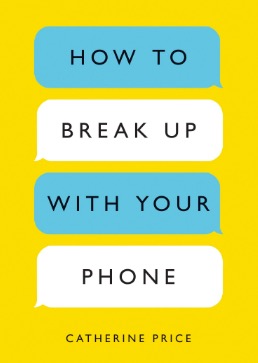By guest reviewer Nicole Baute
Smartphones are destroying our ability to think, relax and notice things — but there’s a book for that
I’ve never thought of myself as addiction-prone. But since the advent of email, social media and smartphones, I’ve become as hooked to technological devices as anyone, and I hate how it makes me feel.
That’s why I jumped at the chance to read and experiment with Catherine Price’s How to Break Up with Your Phone. A science journalist, Price dishes the expected evidence that smartphones are ruining our brains, but as someone with a longstanding interest in meditation, she doesn’t stop there. Price pairs statistics with strategies to scare you into following her step-by-step plan for significantly reducing your smartphone usage so you can spend your life doing things that fill you up instead of stress you out.
Above all, she argues that we reach for our phones because we always reach for our phones and have completely forgotten we’re making a choice.
The scary statistics we all need to hear
The first section of this book answered all the questions that have been rolling around in the back of my head about social media addiction. Price is authoritative and clear as she lays out the science behind our device dependencies. Although none of her statistics are surprising or even necessarily new (she cites many previously published articles), seeing them trotted out one by one scares the thinking person into realizing it’s time for a change.
Our smartphones are designed to addict us, Price explains; our brains release hits of the chemical dopamine not only when we use our phones, but when we think about using them. To make matter worse, we humans are lonely creatures who feel stressed when we miss out on something – and with social media, you’re always missing out on something. This combination makes us crave our phones, even when there is no logical reason to check our Instagram feeds or email accounts because we just did 15 minutes ago.
It gets worse from there.
The first half of this book should be required reading for anyone with a smartphone. After understanding the science on even a basic level you can’t help but look at it differently.
A step-by-step plan for reducing your usage
The second half of the book is a 30-day plan to help you “break up” with your smartphone. Although I didn’t follow it in any remotely methodical way (Price gives you permission to use it as you’d like), I did find several ideas quite helpful.
One of her first steps is to download a smartphone tracking app that will tell you exactly how much time you’re spending on your phone each day along with the number of times you pick it up (I used Moment for iPhone). The idea is to become aware of how much you’re using your phone, along with when you’re using it, allowing you to draw useful conclusions about what you’re trying to accomplish or avoid. I love this app and have happily watched my usage decline over the past few weeks.
However you use Price’s break-up plan, it’s full of suggestions to help you reimagine your relationship with your phone, including a 24-hour detox, family charging stations, and meditation.
Perfect for phone-quitting newbies
If I had any criticism of this book, it would be that some of Price’s advice veers towards the obvious and/or the generic. (I may be as addicted to my phone as everybody else but that doesn’t mean I’ve forgotten the importance of exercise.) For all How to Break Up with Your Phone has to offer, I wonder if there’s an element of preaching to the converted: I picked up the book because I’ve been trying to reduce my smartphone usage for a while already, and as such I’d already considered or tried a fair number of her suggestions.
The sad truth is that the people who need this book the most are probably the least likely to read it — at least until they decide they’re tired of living life on autopilot.
Nicole Baute is a Canadian writer and teacher living in India with her partner and their well-travelled cat. You can learn more about Nicole and read some of her writing at nicolebaute.com.
——
Like this review?
For more reading recommendations, sign up for my newsletter

Published by